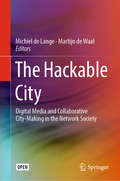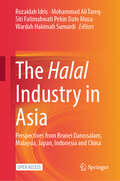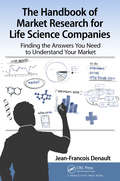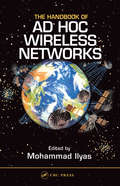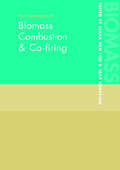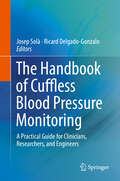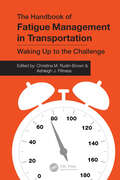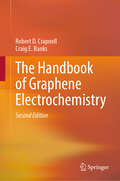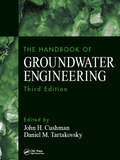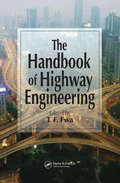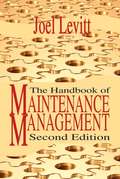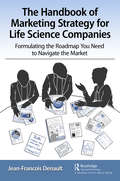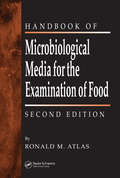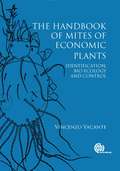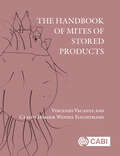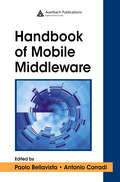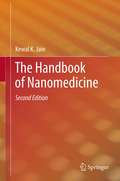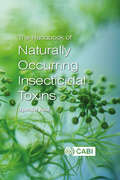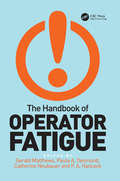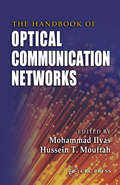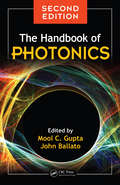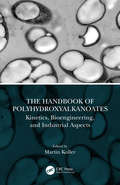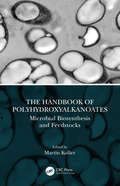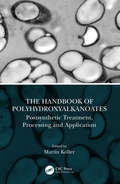- Table View
- List View
The Hackable City: Digital Media and Collaborative City-Making in the Network Society
by Michiel De Lange Martijn De WaalThis open access book presents a selection of the best contributions to the Digital Cities 9 Workshop held in Limerick in 2015, combining a number of the latest academic insights into new collaborative modes of city making that are firmly rooted in empirical findings about the actual practices of citizens, designers and policy makers. It explores the affordances of new media technologies for empowering citizens in the process of city making, relating examples of bottom-up or participatory practices to reflections about the changing roles of professional practitioners in the processes, as well as issues of governance and institutional policymaking.
The Halal Food Handbook
by Stuart Spear Yunes Ramadan Al-Teinaz Ibrahim H. A. Abd El-RahimA unique handbook providing a set of good practice standards for both producers and consumers of Halal food This accessible, authoritative book covers all aspects of Halal from its origins through to how we expect Halal to develop in the coming years. It explains what Halal is, where it came from, how it is practiced, and by whom. In addition to putting Halal in a religious and cultural context, the book provides practical standards for those working in the Halal trade. It explains why there are so many different interpretations of Halal and why this needs to be resolved if international trade is to be developed. Each chapter in The Halal Food Handbook is written by leading experts in their particular field of study. The first one discusses how regulatory bodies have failed to stem the miss selling and adulteration of Halal foods. The next chapters cover the slaughter process and issues around good practice. The book then looks at regulators—covering Sharia law, UK national laws, and the EU—and outlines the legal framework for enforcing the law. It also compares and contrasts different types of religious slaughter for faith foods; examines attempts to set an international standard for trade; and discusses pork adulteration in Halal foods. The final chapter covers other aspects of Halal, including cosmetics, tourism, lifestyle, and banking, and finishes with a look at what the future holds for Halal. Written and edited by leading international experts in Halal who are backed by the Muslim Council of Britain Presents a set of good practice standards for both producers and consumers of Halal food Covers the complexity of the political, legal, and practical dimensions of Halal food production The Halal Food Handbook will appeal to a wide audience, including abattoirs, manufacturers, retailers, regulators, academics, public bodies catering for Muslims, and the broader Muslim community.
The Halal Industry in Asia: Perspectives from Brunei Darussalam, Malaysia, Japan, Indonesia and China
by Rozaidah Idris Mohammad Ali Tareq Siti Fatimahwati Pehin Dato Musa Wardah Hakimah SumardiThis innovative, open access volume explores the core characteristics of the halal industry through case studies of five East and Southeast Asian countries—Brunei Darussalam, Malaysia, Japan, Indonesia and China—representing both Muslim-majority and Muslim-minority societies. The contributors focus on some of the leading sectors of the Islamic economy, comprising food, finance, pharmaceuticals, and travel and tourism, in order to diagnose the challenges they face and the opportunities that present themselves. Particular attention is given to issues of certification and compliance, quality assurance, human resource development, education, legal frameworks, logistics and supply chains, innovation, sustainability, and growth potential beyond the core Muslim consumers in order to offer a critical assessment of the state of the halal industry in comparative perspective. The book shows that one of the most remarkable features of the world economy over the last two decades has been the emergence and sustained growth of the global halal industry. This has been underpinned by several key factors, including a young and expanding Muslim population, Islamic faith-inspired consumption, and a number of public and private strategies dedicated to halal product and service development. This is a significant achievement, especially given major disruptions and risks such as geopolitical instability, the worsening climate crisis, the impact of the Covid-19 pandemic and the uncertainties associated with AI and automation. Academic scholars, university students and others interested in the study of the current state of the halal industry in Asia and broader questions of the global Islamic economy will find this volume an invaluable resource to enable them to understand these pressing challenges and navigate this opportunity landscape.
The Handbook for Market Research for Life Sciences Companies: Finding the Answers You Need to Understand Your Market
by Jean-Francois DenaultAs innovation moves from the lab to the market, a new research phase begins for the entrepreneur: the market research phase. Inspired by a new technology that can change the world, critical questions need to be addressed. Is there a market for my innovation? Who are my clients? What do they need? Is my innovation filling that gap in the market? Who are my competitors? How are they approaching the market? If these questions are unaswered, entrepreneurs meet potential investors or partners with only a basic understanding of their market. The objective of this book is to fill this gap. It is a practical manual that gives entrepreneurs real-world advice and tools to build a solid market model. The book provides tips, models and tools entrepreneurs can use to collect, interpret and present their market and integrate it into their business plan. What the entrepreneur learns in this book will help him throughout his journey. After going over the market research process, he will learn how to design and use a number of market research tools, and how to adapt them in a life science context. From building a web survey to preparing interviews to doing your own secondary research, this handbook will help him gain a comprehensive understanding of how to perform his own market research activities and how to analyze his data. Finally, a number of frameworks (such as the TAM-SAM-SOM as well as the KANO Model) are described so that he can efficiently share what he has learned, using models that simply yet effectively shares findings.
The Handbook of Ad Hoc Wireless Networks (Electrical Engineering Handbook)
by Mohammad IlyasA relative newcomer to the field of wireless communications, ad hoc networking is growing quickly, both in its importance and its applications. With rapid advances in hardware, software, and protocols, ad hoc networks are now coming of age, and the time has come to bring together into one reference their principles, technologies, and techniques.The Handbook of Ad Hoc Wireless Networks does exactly that. Experts from around the world have joined forces to create the definitive reference for the field. From the basic concepts, techniques, systems, and protocols of wireless communication to the particulars of ad hoc network routing methods, power, connections, traffic management, and security, this handbook covers virtually every aspect of ad hoc wireless networking. It includes a section that explores several routing methods and protocols directly related to implementing ad hoc networks in a variety of applications.The benefits of ad hoc wireless networks are many, but several challenges remain. Organized for easy reference, The Handbook of Ad Hoc Wireless Networks is your opportunity to gain quick familiarity with the state of the art, have at your disposal the only complete reference on the subject available, and prepare to meet the technological and implementation challenges you'll encounter in practice.
The Handbook of Biomass Combustion and Co-firing
by Sjaak Van Loo Jaap KoppejanThis unique handbook presents both the theory and application of biomass combustion and co-firing, from basic principles to industrial combustion and environmental impact, in a clear and comprehensive manner. It offers a solid grounding on biomass combustion, and advice on improving combustion systems. Written by leading international academics and industrial experts, and prepared under the auspices of the IEA Bioenergy Implementing Agreement, the handbook is an essential resource for anyone interested in biomass combustion and co-firing technologies varying from domestic woodstoves to utility-scale power generation. The book covers subjects including biomass fuel pre-treatment and logistics, modelling the combustion process and ash-related issues, as well as featuring an overview of the current R&D needs regarding biomass combustion.
The Handbook of Cuffless Blood Pressure Monitoring: A Practical Guide for Clinicians, Researchers, and Engineers
by Josep Solà Ricard Delgado-GonzaloThis book is the first comprehensive overview of the emerging field of cuffless blood pressure monitoring. Increasing clinical evidence proves that longitudinal measurements of blood pressure allow for earlier detection and better management of multiple medical conditions and for superior prediction of cardiovascular events. Unfortunately, today’s clinical and industry standards for blood pressure monitoring still require the inflation of a pneumatic cuff around a limb each time a measurement is taken. Over the last decades clinicians, scientists and device manufacturers have explored the feasibility of technologies that reduce or even completely eliminate the need of cuffs, initiating the era of cuffless blood pressure monitoring. Among the existing literature, this book is intended to be a practical guide to navigate across this emerging field. The chapters of the handbook have been elaborated by experts and key opinion leaders in the domain, and will guide the reader along the clinical, scientific, technical, and regulatory aspects of cuffless blood pressure monitoring.
The Handbook of Fatigue Management in Transportation: Waking Up to the Challenge
by Rudin-Brown, Christina M. Ashleigh J. FiltnessIn the world of transportation, fatigue is a silent killer that can affect us all. Understanding fatigue, including how to manage it to minimize safety risk, is of great importance. However, while it is one thing to recognize that fatigue is a critical safety issue, it is quite another to set up a successful, scientifically informed fatigue risk management programme. This book is here to help. It has been carefully designed as a comprehensive reference point, bringing together international expertise from leaders in fatigue science, and showcasing valuable insights from transportation industry practitioners. The 40 authored chapters are divided into six sections, to better understand fatigue science, the consequences of fatigue in transportation, contributors to fatigue, managing fatigue and promoting alertness, real world case studies of fatigue management in practice, and future perspectives. While it is possible to read each chapter in isolation, most will be gained by reading the book as a whole. Each chapter starts with an abstract overview and concludes with summary bullet points, creating a handy "quick check" for key points. This accessible text is for those who are interested in supporting alert and safe transportation operations. It is suitable for professionals, transport managers, government advisors, policy makers, students, academics, and anyone who wants to learn more. All transport modes (road, rail, maritime and aviation) are considered. For anyone waking up to the complex challenge of fatigue management, this handbook is a must.
The Handbook of Graphene Electrochemistry
by Craig E. Banks Robert D. CrapnellThis book charts the history of graphene, depicting how it has made an impact in the field of electrochemistry and how scientists are trying to unravel its unique properties. Graphene has grasped the attention of academia and industry worldwide due its unique structure and reported advantageous properties. This was reflected via the 2010 Nobel Prize in Physics being awarded for groundbreaking experiments regarding the two-dimensional material graphene. One particular area in which graphene has been extensively explored is electrochemistry where it is potentially the world’s thinnest electrode material. Graphene has been widely reported to perform beneficially over existing electrode materials when used within energy production or storage devices and when utilized to fabricate electrochemical sensors. A fundamental introduction into Graphene Electrochemistry is given, through which readers can acquire the tools required to effectively explain and interpret the vast array of graphene literature. The readers are provided with the appropriate insights required to be able to design and implement electrochemical experiments when utilizing graphene as an electrode material. This new, updated and extended second edition also explores other 2D materials and covers a chapter on the use of graphene in additive manufacturing.
The Handbook of Groundwater Engineering, Third Edition
by Daniel M. Tartakovsky John H. CushmanThis new edition adds several new chapters and is thoroughly updated to include data on new topics such as hydraulic fracturing, CO2 sequestration, sustainable groundwater management, and more. Providing a complete treatment of the theory and practice of groundwater engineering, this new handbook also presents a current and detailed review of how to model the flow of water and the transport of contaminants both in the unsaturated and saturated zones, covers the protection of groundwater, and the remediation of contaminated groundwater.
The Handbook of Highway Engineering
by T. F. FwaModern highway engineering reflects an integrated view of a road system's entire lifecycle, including any potential environmental impacts, and seeks to develop a sustainable infrastructure through careful planning and active management. This trend is not limited to developed nations, but is recognized across the globe. Edited by renowned authority
The Handbook of Maintenance Management
by Joel LevittNow in its second edition and written by a highly acclaimed maintenance professional, this comprehensive and easy-to-understand resource provides a short review of all the major discussions going on in the management of the maintenance function. This revision of a classic has been thoroughly updated to include advances in technology and thinking and is sure to be found useful by maintenance professionals everywhere. It's the perfect reference for any maintenance professional that needs a quick update on any specific area within the subject.
The Handbook of Marketing Strategy for Life Science Companies: Formulating the Roadmap You Need to Navigate the Market
by Jean-Francois DenaultThe proposed book is follows in the same steps as the first book in the series, The Handbook of Market Research for Life Sciences. While the first book focused on the techniques and methodologies to collect the market data you need to evaluate your market as well as presentation models for your data, the second volume will focus more on the commercialization elements of marketing. As such, this book will be covering a wide range of topics directly tied to marketing management such as marketing and commercialization strategies, consumers’ behaviors, marketing metrics, pricing techniques and strategies as well as marketing communications (public relations, advertising, and more). The objective of this book is to focus exclusively on the marketing aspects for life sciences, providing entrepreneurs with a toolkit of tools they can use throughout the marketing process, from market planning to commercialization. The overall objective is for them to gain an understanding on the marketing function, ask the right question, and be able to tackle simple to complex topics.
The Handbook of Microbiological Media for the Examination of Food
by Ronald M. AtlasResponding to an estimated 14 million cases of food-borne disease that occur every year in the United States alone, the Food and Drug Administration and US Department of Agriculture have begun implementing new regulations and guidance for the microbial testing of foods. Similarly, Europe and other regions are implementing stricter oversight, as foo
The Handbook of Mites of Economic Plants
by Vincenzo VacanteMites pose a serious problem to plants worldwide, attacking crops and spreading disease. When mites damage crops of economic importance the impacts can be felt globally. Mites are among the most diverse and successful of invertebrates, with over 45,000 described species, with many more thousands to be discovered. They are responsible for a significant portion of the losses of crops for food, fibre, industry and other purposes, and require expensive and often controversial pest control measures. Understanding these mites is vital for entomologists, pest researchers, agronomists and food producers. Knowledge of mite pests helps to inform control strategies and optimize the production of economic plants and the agrarian economy. This encyclopedia provides a thorough coverage of the mites and the problems they cause to crops, yet it is easily searchable, organised by mite species and subdivided into helpful headings. It takes a worldwide view of the issue of mites injurious to economic plants, describing mites prevalent in different regions and discussing control methods appropriate in different environments. This book provides an encyclopaedic reference to the major mites, described by family in terms of their internal and external morphology, bio-ecology and family systematics. Methods of mite collection and laboratory study is described, as well as species diagnostic characteristics, worldwide distribution, host plants, identification by the type of damage they cause and control strategies, including chemical and biological intervention and integrated pest management measures. Mites of the following families are included: (Eriophyoidea, Tarsonemidae, Tuckerellidae, Tenuipalpidae, Tetranychidae, Acaridae, Penthaleidae). Mites of Economic Plants is an important resource for students of entomology and crop production, and as a thorough reference guide for researchers and field workers involved with mites, crop damage and food production.
The Handbook of Mites of Stored Products
by Vincenzo Vacante Dr Carlos Holger FlechtmannStorage mites are common pests of stored food and other processed agricultural products and an infestation can occur at any point throughout the supply chain. Their presence is associated with serious hygienic implications and economic loss and can be harmful to the health of humans and animals. This book provides a comprehensive and up-to-date study of mites associated with these products, covering core concerns including the mites of cheese, ham and sausages, mushrooms and vegetable fibres. Numerous species belonging to different families are described and illustrated in addition to the inclusion of general chapters on: - Systems of Acari - Classification of mites of stored food - External and internal morphology - Bio-ecology - Collecting and detecting, preserving, preparing and rearing - Damage and control. Written by an experienced author within the field, this is an important resource for researchers, laboratory scientists and students involved in acarology, agricultural entomology, pest management, and food preservation, science and safety.
The Handbook of Mobile Middleware
by Paolo Bellavista Antonio CorradiDevice miniaturization, wireless computing, and mobile communication are driving ubiquitous, pervasive, and transparent computing. Supporting these rapidly evolving technologies requires middleware solutions that address connectivity-level, location-dependent, and context-dependent issues.The Handbook of Mobile Middleware is an exhaustive o
The Handbook of Nanomedicine
by Kewal K. JainNanomedicine is defined as the application of nanobiotechnology in clinical medicine, which is currently being used to research the pathomechanism of disease, refine molecular diagnostics, and aid in the discovery, development, and delivery of drugs. In The Handbook of Nanomedicine, Second Edition, Prof. Kewal K. Jain updates, reorganizes, and replaces information in the comprehensive first edition in order to capture the most recent advances in this dynamic field. Important components of nanomedicine such as nanodiagnostics and nanopharmaceuticals, where the greatest number of advances are occurring, are covered extensively. As this text is aimed at nonmedical scientists, pharmaceutical personnel, as well as physicians, descriptions of the technology involved and other medical terminology are kept as clear and simple as possible. In depth and cutting-edge, The Handbook of Nanomedicine, Second Edition informs its readers of the ever-growing field of nanomedicine, destined to play a significant role in the future of healthcare.
The Handbook of Naturally Occurring Insecticidal Toxins
by Opender KoulNaturally occurring toxins are among the most complicated and lethal in existence. Plant species, microorganisms and marine flora and fauna produce hundreds of toxic compounds for defense and to promote their chances of survival, and these can be isolated and appropriated for our own use. Many of these toxins have yet to be thoroughly described, despite being studied for years. Focusing on the natural toxins that are purely toxic to insects, this book contains over 500 chemical structures. It discusses the concepts and mechanisms involved in toxicity, bioassay procedures for evaluation, structure-activity relationships, and the potential for future commercialization of these compounds. A comprehensive review of the subject, this book forms an important source of information for researchers and students of crop protection, pest control, phytochemistry and those dealing in insect-plant interactions.
The Handbook of Operator Fatigue
by Gerald Matthews P.A. HancockFatigue is a recognized problem in many facets of the human enterprise. It is not confined to any one area of activity but enters all situations in which humans have to perform for extended intervals of time. Most problematic are the circumstances in which obligatory action is continuous and the results of failure are evidently serious or even catastrophic. Therefore, the modern media especially highlights fatigue-related failures in industries such as transportation, materials processing and healthcare. It can be, and indeed is, no coincidence that most of the spectacular failures in process control that have resulted in the world's largest industrial accidents have occurred in the small hours of the morning when the circadian rhythm is lowest and operator fatigue itself peaks. While there have been legislative efforts made at state, federal and international levels to regulate working hours of employees, the appropriate implementation of such legislation is still a long way off. The Handbook of Operator Fatigue provides a comprehensive account of the subject to serve as the definitive reference work for researchers, students and practitioners alike. The volume features 30 chapters written by experts from around the world to address each important facet of fatigue, including: the scale of the fatigue problem (Section I), the nature of fatigue (Section II), how to assess fatigue (Section III), the impact of fatigue on health (Section IV), fatigue in the workplace (Section V), the neurological basis of fatigue (VI), sleep disorders (VII), and the design of countermeasures to fatigue (VIII).
The Handbook of Optical Communication Networks
by Hussein T. Mouftah Mohammad IlyasThe Internet revolution. Once, the public was delighted with 14.4 modem access and fascinated by low-tech Web site content. But not for long. Technology has raced to keep up with users' calls for high-speed facilities and advanced applications. With the development of high-speed transmission media and the availability of high-speed hardware, we are
The Handbook of Photonics
by Mool C. Gupta John BallatoReflecting changes in the field in the ten years since the publication of the first edition, The Handbook of Photonics, Second Edition explores recent advances that have affected this technology. In this new, updated second edition editor Mool Gupta is joined by John Ballato, strengthening the handbook with their combined knowledge and the continued contributions of world-class researchers.New in the Second Edition:Information on optical fiber technology and the economic impact of photonics Coverage of emerging technologies in nanotechnology Sections on optical amplifiers, and polymeric optical materialsThe book covers photonics materials, devices, and systems, respectively. An introductory chapter, new to this edition, provides an overview of photonics technology, innovation, and economic development. Resting firmly on the foundation set by the first edition, this new edition continues to serve as a source for introductory material and a collection of published data for research and training in this field, making it the reference of first resort.
The Handbook of Polyhydroxyalkanoates: Kinetics, Bioengineering, and Industrial Aspects
by Martin KollerThis second volume of the "Handbook of Polyhydroxyalkanoates (PHA): Kinetics, Bioengineering and Industrial Aspects" focusses on thermodynamic and mathematical considerations of PHA biosynthesis, bioengineering aspects regarding bioreactor design and downstream processing for PHA recovery from microbial biomass. It covers microbial mixed culture processes and includes a strong industry-focused section with chapters on the economics of PHA production, industrial-scale PHA production from sucrose, next generation industrial biotechnology approaches for PHA production based on novel robust production strains, and holistic techno-economic and sustainability considerations on PHA manufacturing. Aimed at professionals and graduate students in Polymer (plastic) industry, wastewater treatment plants, food industry, biodiesel industry, this book Provides an insight into microbial thermodynamics to reveal the central domain governing in PHA formation, both aerobically and anaerobically. Includes systematic overview of mathematical modelling approaches, starting from low-structured and formal kinetic models until modern tools like metabolic models, cybernetic models and so forth Discusses challenges during scale up of PHA production processes and on development of non-sterile processes and contamination-resistant strains Presents a holistic picture of the current state of PHA research by mixed cultures Reviews the industry-related point of view about current and future trends in PHA production and processing
The Handbook of Polyhydroxyalkanoates: Microbial Biosynthesis and Feedstocks
by Martin KollerThe first volume of the "Handbook of Polyhydroxyalkanoates (PHA): Microbial Biosynthesis and Feedstocks" focusses on feedstock aspects, enzymology, metabolism and genetic engineering of PHA biosynthesis. It addresses better understanding the mechanisms of PHA biosynthesis in scientific terms and profiting from this understanding in order to enhance PHA biosynthesis in bio-technological terms and in terms of PHA microstructure. It further discusses making PHA competitive for outperforming established petrol-based plastics on industrial scale and obstacles for market penetration of PHA. Aimed at professionals and graduate students in Polymer (plastic) industry, wastewater treatment plants, food industry, biodiesel industry, this book Covers the intracellular on-goings in PHA-accumulating bacteria Assesses diverse feedstocks to be used as carbon source for PHA production including current knowledge on PHA biosynthesis starting from inexpensive waste feedstocks Summarizes recent relevant results dealing with PHA production from various organic by-products Presents the key elements to understand and fine-tune the microstructure and sequence-controlled molecular architecture of PHA co-polyesters Discusses the use of CO-rich syngas, sourced from various organic waste materials, for PHA biosynthesis
The Handbook of Polyhydroxyalkanoates: Postsynthetic Treatment, Processing and Application
by Martin KollerThe third volume of the Handbook of Polyhydroxyalkanoates (PHA) focusses on the production of functionalized PHA bio-polyesters, the post-synthetic modification of PHA, processing and additive manufacturing of PHA, development and properties of PHA-based (bio)composites and blends, the market potential of PHA and follow-up materials, different bulk- and niche applications of PHA, and the fate and use of spent PHA items. Divided into fourteen chapters, it describes functionalized PHA and PHA modification, processing and their application including degradation of spent PHA-based products and fate of these bio-polyesters during compositing and other disposal strategies. Aimed at graduate students and professionals in Polymer science, chemical engineering and bioprocessing, it: Covers current state of the art in the development of chemically modifiable PHA including mult-istep modifications of isolated biopolyesters, short syntheses of monomer feedstocks and so forth. Describes design of functionalized PHA-based polymeric materials by chemical modification . Illustrates preparation of bioactive oligomers derived from microbial PHA and synthetic analogues of natural PHA oligomers. Discusses processing and thermomechanical properties of PHA. Reviews advantages of PHA against other bio-based and conventional polymers with current applications and potential uses of PHA-based polymers highlighting innovative products.
